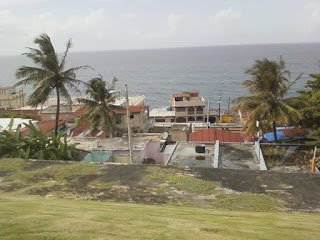Just an hour before my wife an I landed in her native Puerto Rico last month, the island's government had defaulted on $1 billion in bond interest payments. It was the second default in five months for the cash-strapped government whose debt now totals $72 billion. None of this was evident as we waded through the crowds in Rafael Hernà �ndez airport in Aguadilla, which had been converted into a civilian airport after the closure of Ramey Air Force Base 40 years earlier. People hugged their relatives, welcoming them back home or bidding them farewell. It was a normal scene you'd see at any airport in the world. But the situation in Puerto Rico is not normal, and you don't have to spend long there to see how regular people are suffering more every day under the crushing burden of debt.
You notice every time you make a purchase at the store or get the check at a restaurant. The sales tax in Puerto Rico now stands at 11.5 percent, after being raised 64 percent in July from 7 percent. The measure was approved by the island's governor, Alejandro Garca Padilla, in conjunction with a package of austerity measures to raise money to pay the interest on the island's debt to creditors.
This might not sound like an astronomical amount, but the impact is felt more in Puerto Rico than it would be in any of the states. Sales taxes are regressive. People with lower incomes spend more of their earnings on things that are taxed than those who can afford to store their income as savings. This means the lower your income, the harder you will be hit by the sales tax.
Outside a beachfront restaurant in Aguada, I noticed an SUV with a bumper sticker that summed up the feelings of many Puerto Ricans. "The debt is not ours, it belongs to the Empire," it read. Many people may believe this represents Puerto Ricans failing to take responsibility for running up a tab they now can't pay. But this would falsely assume that Puerto Rico exercises independent control over the conditions that created the debt. In reality, Puerto Rico is a colony whose political and economic structures are determined by the dictates of the empire they belong to.
Constrained by the neoliberal capitalist system of the United States, Puerto Rico is unable to chart its own course for independent economic development. The Interstate Commerce Clause of the Constitution makes it impossible for Puerto Rico to protect its own industries. They must allow American businesses equal access to Puerto Rico's markets. The Cabotage Laws make shipping to and from Puerto Rico prohibitively expensive, impeding demand for exports and driving up prices on imports.
The detrimental effects of U.S.-imposed restrictions on Puerto Rico's economy have forced them to incur debt to pay for social spending. Unlike every other industrial country in the world, the United States does not provide universal health care to its citizens. The federal programs that are supposed to guarantee insurance for the poor and the elderly do not apply equally to Puerto Rico.
Puerto Rico only receives half the rate of federal healthcare funding as the 50 states, even though its residents pay the same rates in payroll taxes. This strain was further exacerbated last month when the U.S. government cut payments to Puerto Rico's Medicare Advantage program by 11 percent. My in-laws told us how their prescription deductibles and their co-pays under their Medicare Advantage plans had increased. The Puerto Rican Healthcare Crisis Coalition (PRHCC) called the decision by the Centers for Medicare and Medicaid Services a "blow to the health of the entire Puerto Rican community."
The Affordable Care Act (Obamacare), which is supposed to guarantee health insurance to the rest of the population, does not apply equally to Puerto Rico either. While Puerto Rico passed its own laws requiring features of Obamacare - such as prohibiting denial of insurance based on pre-existing conditions and caps on coverage - there is no individual mandate. The result is a "death spiral" for private insurance plans. Elderly and sick people purchase coverage, while younger and healthier customers, who don't need the same level of costly care, opt not to participate. This drives up premiums drastically, making plans prohibitively expensive for those who need them most.
With federal government spending and local tax revenue insufficient to meet the population's health care needs, the Puerto Rican government must assume more debt to cover the difference.
Privatization of Public Assets
Like countries across the global South who have found themselves indebted to U.S.-run institutions such as the World Bank and International Monetary Fund, Puerto Rico has been encouraged to privatize its public assets and use the money to pay its creditors.
(Note: You can view every article as one long page if you sign up as an Advocate Member, or higher).





